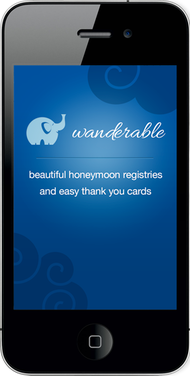 Courtesy of Wanderable Wanderable founders: Jenny Chen, left, and Marcela Miyazawa.
Courtesy of Wanderable Wanderable founders: Jenny Chen, left, and Marcela Miyazawa.
Site Insight
What’s wrong with this site?
“No one has told me that they got into mobile too soon,” is what a savvy venture capitalist told me recently during a meeting in my office. And that’s why so many Web site owners are trying to create the right smartphone experience.
Most companies are either optimizing their entire site so it appears clearly and is easy to navigate on a phone screen, or they are building a dedicated iPhone or Android application. Many are playing catch up.
Today we meet Marcela Miyazawa, a founder of Wanderable, a gift registry for honeymooners that makes it easy for couples to send personalized, old-fashioned, physical thank-you notes — and, yes, avoid the pain of spending months trying to get through a pile of notes. Ms. Miyazawa and her co-founder, Jenny Chen, introduced the Web site in January, 2012 and have been satisfied with the number of users it has attracted, especially through organic search.
Last fall, they coded an iPhone app themselves and released it in November, believing that it would be the ideal extension of the site and quickly attract downloads. Instead, after an initial few hundred, the app has found few takers.
Here’s how it works: Wanderable’s mobile app lets honeymooners perform two key functions. First, they can create a registry where they list things they would like to receive as presents. Then, when they take their honeymoon, they can upload a photograph of themselves enjoying their honeymoon gifts — a massage, a bicycle tour, a room in a hotel, a bottle of Champagne — and Wanderable will “auto-magically” transform the photo into a postcard with a printed thank you that will arrive at the giver’s home a few days later. When the very happy couple returns home, their thank-yous will have already been sent.

Ms. Miyazawa and Ms. Chen say the feedback from those who have used the app has been positive, with users appreciating the ease and personal touch. As a result, they say they are content with the functionality and the user interface, and they have decided to wait until they are able to collect more user data on the app before investing further. For now, their challenge is to find a larger audience.
The well known channels for marketing a new iPhone app include:
Pay-per-install: working with a third-party marketer who only charges the company when a user downloads the app. The quoted prices have been too high, Ms. Miyazawa said, explaining that there is a fear that Apple will pull apps that pay for downloads from its App store.
Facebook ads: One advantage of advertising on Facebook is the ability to target the audience using filters for things like location, education and Facebook followers. But Ms. Miyazawa found she was unable to get the Facebook audience to download. “People use Facebook as a social tool,” she said. “They don’t pay attention to the ads. We can target effectively, but we don’t see action.”
Bloggers: Getting a mention in a highly trafficked wedding blog, Ms. Miyazawa said, can cost $1,000 to $2,500, and there is no guarantee of effectiveness. Plus, one of the best known publications in the wedding industry, The Knot, has a somewhat competitive app, which has ruled it out as a marketing channel.
In hindsight, Ms. Miyazawa and Ms. Chen stand by their decision to design and build the app in-house — in part because it gave them the ability to update features and fix bugs quickly. But they acknowledge a lack of focus on a cohesive marketing plan before the introduction. I have a mobile-savvy friend, Ariel Seidman, founder of Gigwalk, who says, “The Web is where you acquire users, and apps are where you engage and retain them. You need to figure out that funnel before you design your app. If you are counting on App Store promotion and pay-per-installs, you have already lost.”
What do you think? Does this app have a future?
Richard Demb is co-founder of Abe’s Market, an online marketplace for natural products that is based in Chicago.
Article source: http://boss.blogs.nytimes.com/2013/05/16/a-start-up-struggles-to-market-its-iphone-app/?partner=rss&emc=rss